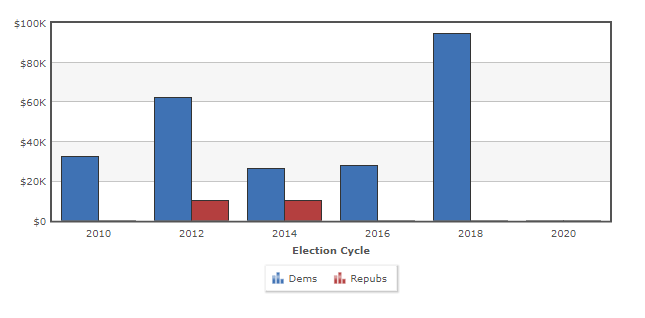It’s not every day a former U.S. ambassador and an LGBT rights group go at it on Twitter. But that’s what happened during a recent flare-up between former Trump appointee Richard Grenell and the LGBTQ Victory Fund, a group that describes its goal as “work[ing] to recruit, train and elect out public officials at every level and in all 50 states.”
When Grenell criticized the group’s ideological litmus tests, it responded by publicly denouncing the former ambassador, who was until recently the highest-ranking gay official in the Trump administration. The Victory Fund wrote in a tweet that “it costs $0 to love yourself” and that Grenell “oughta try it sometime.”
It costs $0 to love yourself.@RichardGrenell, you oughta try it sometime.
— LGBTQ Victory Fund (@VictoryFund) July 20, 2020
What started out as a personal dispute ended up thrusting the very nature of modern LGBT activism into the spotlight. The Victory Fund claims to be bipartisan, but its record suggests that it really only works to get LGBT Democrats elected.
“We work hard to endorse Republicans,” Victory Fund President Annise Parker said in a recent interview, even though the super PAC spent $0 on Republican campaigns in 2018 or 2020. Next came the but where Parker tried to explain away this discrepancy.
“Candidates have to believe in some level of a right to privacy, which includes the right to abortion,” Parker continued. “And they have to be fully trans-inclusive.” Parker also claimed that the Trump administration and the Right more broadly are anti-LGBT and suggested that “if you have any self-respect,” LGBT candidates have to oppose them.
So, let’s be clear: The Victory Fund is only willing to endorse Republicans if they are pro-choice, embrace left-wing gender theory, and reject the modern GOP and the Republican president of the United States. That sure is a strange definition of “bipartisanship.” The sad truth is that this group, like most modern LGBT activist organizations, is little more than a de facto arm of the Democratic National Committee.
It seeks to advance an ideology, not an identity.
Since the 2010 election cycle, the LGBTQ Victory Fund has spent about $264,000 on candidates, but only $20,000 on Republicans (and $19,000 of that was to one candidate, Richard Tisei). It spent $0 on GOP candidates in 2016 or 2018, and it would be shocking if it gave a significant sum to any Republican in a competitive election in 2020.

Consider how the organization treated Carl DeMaio, a socially centrist, pro-choice gay Republican who ran for California’s 50th Congressional District and lost narrowly in a March primary. His campaign was perhaps the single most promising effort to get a gay Republican elected to Congress this cycle, yet the Victory Fund did not endorse him. DeMaio even told me that when he sought its endorsement in 2012 for a mayoral campaign, the Victory Fund leaked the campaign materials he provided for review to his Democratic opponent.
“The Victory Fund will invent any reason not to endorse a viable openly gay Republican,” DeMaio told me in an interview. “These people are Democratic activists masquerading as bipartisan LGBT advocates.”
“They do not want Republican LGBT elected officials in this country because those officials would be dangerous,” DeMaio continued. “They would become role models, and show the LGBT community that you don’t have to be flaming liberals, show them that there is diversity of thought. If people like me win … that is very dangerous to [the Victory Fund] because they need to keep political dissent in the closet.”
It’s hard not to draw that conclusion from the way the Victory Fund has snubbed candidates such as DeMaio, as well as Matt Mayberry, a viable gay Republican candidate running for New Hampshire’s 1st Congressional District. The Victory Fund has not endorsed his campaign.
Grenell, a pioneer for gay representation in government by any objective measure, shares this concern about the Victory Fund’s partisan slant.
“Instead of working for greater equality and acceptance for gays and lesbians, these partisan activists seek to expand the Democrat Party,” Grenell told me. “These groups refuse to accept that gays and lesbians are everywhere and think very differently. It’s time to stop demanding we think or vote as a group controlled by a few self-important people in Washington, D.C.”
The Victory Fund’s Democratic bias actually sabotages the gay rights movement. “Our goal is to have [LGBT] representation in every state house, and then, ultimately, in every state Senate in America,” Parker said while promoting the group’s 2020 election push. “It slows down the bad bills and changes the discussion. You get one person in, and they actually can stop the bad stuff.”
Yet this isn’t a partisan phenomenon. Indeed, some of the boldest gay rights reforms in recent years, from banning anti-gay conversion therapy to passing anti-discrimination laws, have come in dark-red states such as Utah. Having LGBT Republicans in the mix would only further this movement across all levels of government.
So when the Victory Fund fails to promote gay and transgender candidates across the spectrum, it doesn’t just fall victim to the partisan impulses that inevitably corrupt most super PACs. It undermines the very goal of LGBT equality it was founded to advance.
Brad Polumbo (@Brad_Polumbo) is a freelance journalist and Washington Examiner contributor.

